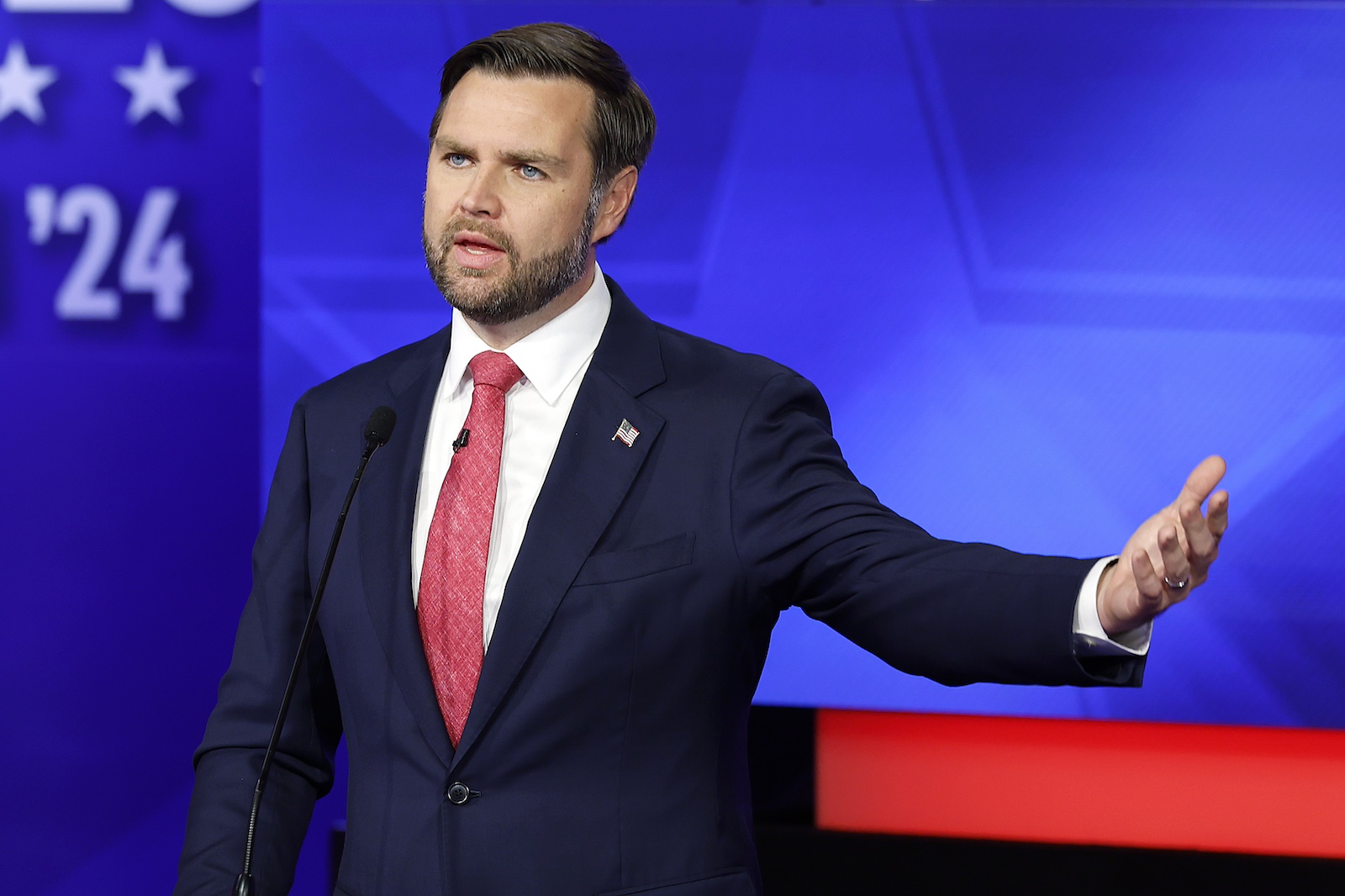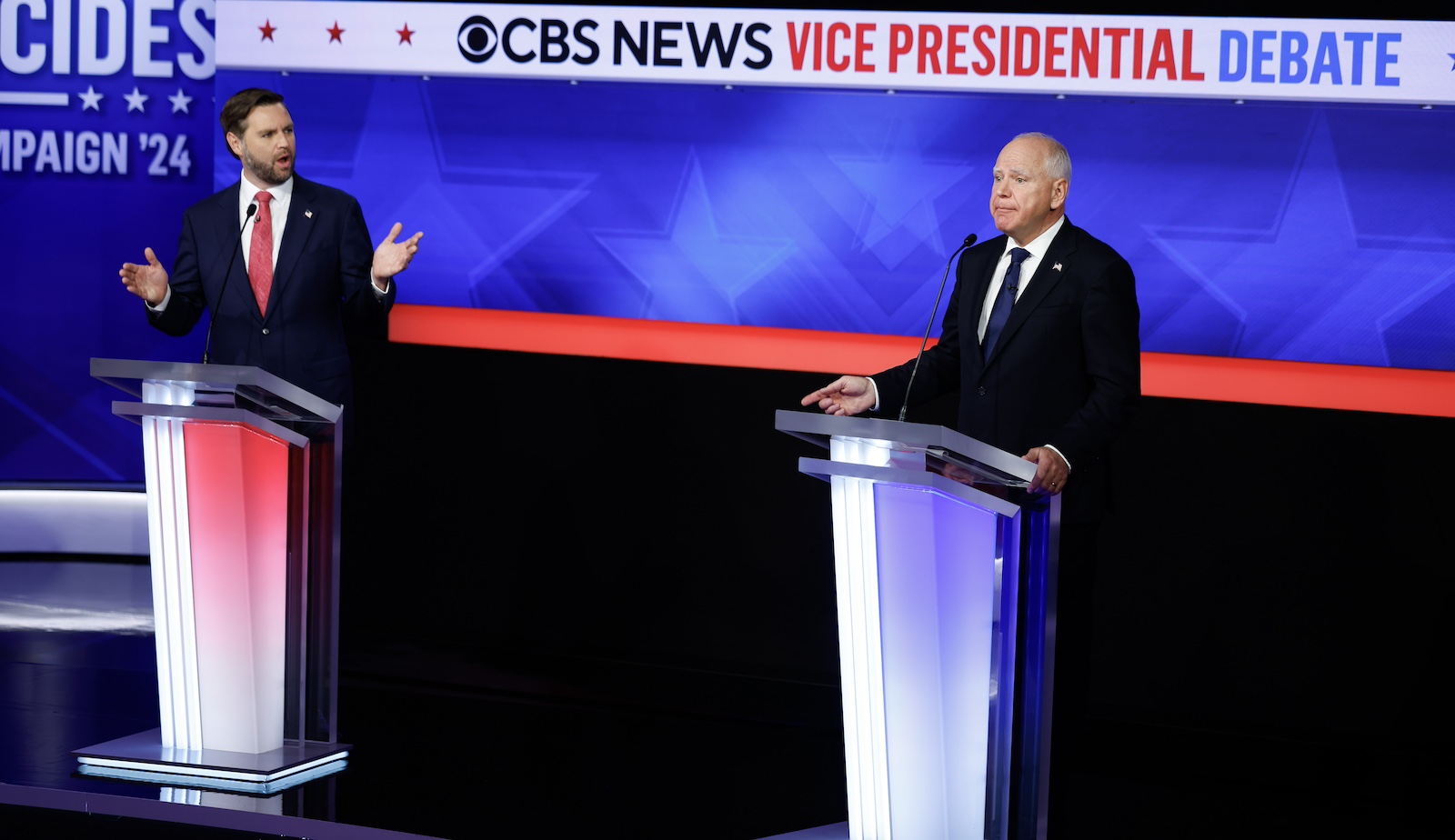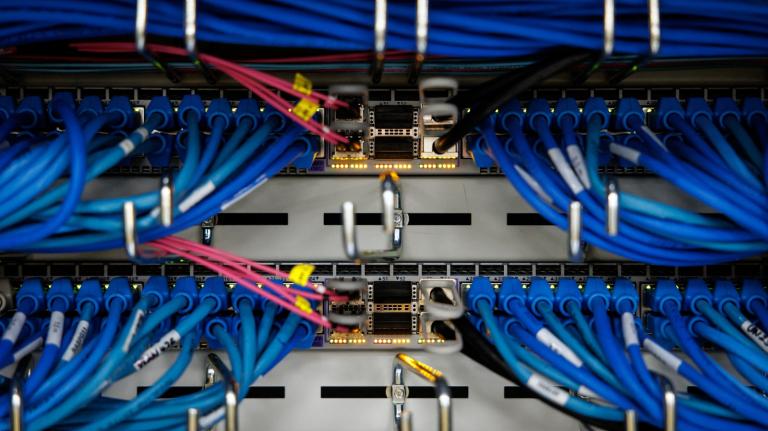Vice presidential hopefuls Tim Walz, the Democratic governor of Minnesota, and J.D. Vance, the junior Republican senator from Ohio, faced off Tuesday night in New York. It was the first time the two men have debated, and likely the last debate of this year’s race to the White House. The evening began with a decidedly less awkward handshake than the one that kicked off the presidential debate a month ago, and quickly moved into a foreign policy question. One unknown at the outset, however, was to what extent the moderators or the candidates would bring up climate change.
At the presidential debate between Vice President Kamala Harris and former President Donald Trump last month, the climate question didn’t come until the tail end of the candidates’ sparring session. This time it was the second question that moderators asked, and both candidates tacked notably to the political center, with Walz endorsing “an all-above energy policy” and Vance seeking to sidestep the question of whether human-caused climate change is happening.
The debate came amid a politically and climatically dramatic few months. Walz and Harris arrived to the race historically late and have been sprinting to make their views on a myriad of issues known, including climate change. And while climate ranks at the bottom of the list of voter concerns, climate change-fueled disasters have been battering the country, from flooding in Vermont to wildfires in California and, most recently, the tranches of devastation that Hurricane Helene wrought along the southeastern United States.
CBS News moderators Norah O’Donnell and Margaret Brennan pegged their question to Helene and pointed to research showing that climate change makes hurricanes “larger, stronger, and more deadly,” as well as polling showing that 7 in 10 Americans favor taking steps to address climate change.
Both candidates responded by expressing their condolences to the victims of the hurricane, with Vance calling it an “unbelievable, unspeakable human tragedy.” They differed, however, on both the causes and the solutions to the broader climate question.
Vance, who answered first, endorsed a robust federal response to help disaster victims before turning to the bigger picture. He avoided acknowledging the reality of human-caused climate change, instead referring to “crazy weather patterns” and global warming as “weird science.” For the sake of argument, Vance started from the premise that carbon emissions drive climate change — “Let’s just say that’s true,” he said. Vance argued that bringing manufacturing back to the United States would reduce emissions, falsely claiming that America has “the cleanest economy in the entire world.”
In regard to solutions, Vance derided the Biden administration’s incentivization of solar panels because, he said, their components often come from abroad. He alluded to the potential for building new nuclear energy facilities and explicitly called for more energy production domestically, without specifically mentioning oil or natural gas.

If Vance hedged over the reality of climate change, Walz stated the problem emphatically. “Climate change is real. Reducing our impact is absolutely critical,” he said, touting the Biden administration’s Inflation Reduction Act, the biggest clean energy spending bill in history, which he said “has created jobs across the country.” In an awkward turn of phrase, Walz said, “We are seeing us becoming an energy superpower for the future, not just the current.”
He did not take the opportunity to highlight his own climate record, which is remarkably lengthy. As governor of Minnesota, he signed legislation that reformed clean energy permitting and requires the state’s utilities to get 100 percent of their energy from clean sources by 2040. Walz also failed to mention his support of the expansion of the Line 3 oil pipeline that runs through Minnesota, which is having the same climate impact as 50 new coal-fired power plants.
Ultimately, the climate consequences of this election could be enormous. It could, for instance, determine how close the U.S., which has emitted more greenhouse gases throughout history than any other country, comes to achieving the dramatic emissions cuts scientists say are needed to avoid the worst impacts of global warming. And even a casual debate viewer couldn’t miss the two candidates’ divergent views on America’s energy future.
The Democratic ticket has framed combating the climate crisis as a matter of protecting freedom, and has urged the continued investment in clean energy. The official GOP platform, on the other hand, includes a rollback of rules encouraging the adoption of electric vehicles and calls for the United States to become the world leader in oil, gas, and coal production. Some researchers have estimated that a second Trump term could add an extra 4 billion metric tons of carbon to the atmosphere by 2030, compared to a Democratic presidency.
Vance returned to the theme of domestic energy production throughout the debate, at one point saying that one of the quickest ways to address the housing crisis is to “drill, baby, drill.” His closing statement included an anecdote about how when he was growing up, his grandmother didn’t always have enough money to turn on the heat — and he argued that Biden and Harris’ energy policies are making it harder for everyday Americans to afford energy. (The Inflation Reduction Act is expected to save Americans $38 billion in electricity bills by 2030.) Climate and energy did not come up in Walz’s closing statement.




